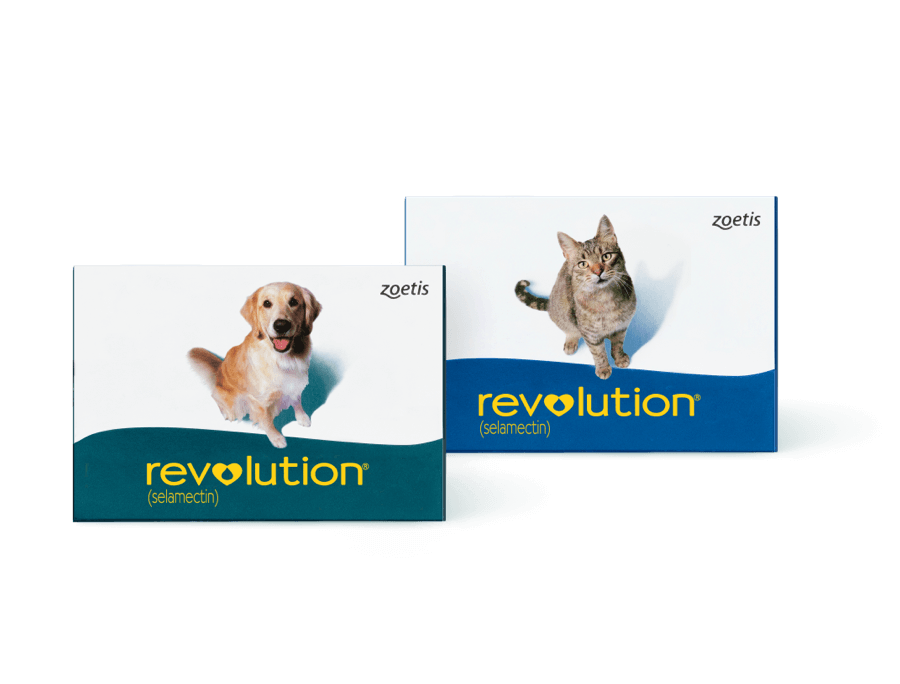
Protect Your Pet From Harmful Parasites with One Monthly Application



Revolution provides broad coverage in one simple, monthly topical application.
Protects dogs against fleas, ticks*, ear mites, heartworm disease, and sarcoptic mites.
Protects cats against fleas, ear mites, heartworm disease, roundworms, and hookworms.
Revolution is available from select retailers and vets with a valid prescription.


Unlike some other brands, Revolution does not require gloves to apply, or separation time after application.
Simply wash your hands after applying and continue spending time with your pet as usual.
One monthly dose protects pets against common parasites.
Demonstrated safe for dogs at least 6 weeks of age, and for cats at least 8 weeks of age.

It’s important to apply Revolution at the same time every month to keep your pet protected. Stay on track with our monthly text or email reminders.
Parasites are not just “outdoor-only.” Any dog or cat could come in contact with harmful pests at any time of year.
Revolution is demonstrated safe for dogs as young as 6 weeks of age, and cats as young as 8 weeks of age.
IMPORTANT SAFETY INFORMATION: See Prescribing Information. Do not use Revolution on sick, weak, or underweight animals. Use only on cats 8 weeks and older. Use only on dogs 6 weeks and older. Prior to administration, dogs should be tested for heartworms. In cats, side effects may include digestive upset and temporary hair loss at application site with possible inflammation. In people, Revolution may be irritating to skin and eyes. Wash hands after use.
Simparica Trio
Use with caution in dogs with a history of seizures. Simparica Trio contains sarolaner, a member of the isoxazoline class, which has been associated with neurologic adverse reactions including tremors, ataxia, and seizures in dogs with or without a history of neurologic disorders. The safe use of Simparica Trio has not been evaluated in breeding, pregnant, or lactating dogs. The most frequently reported adverse reactions in clinical trials were vomiting and diarrhea. See Prescribing Information.
Revolution Plus
The safe use of Revolution Plus has not been established in kittens less than 8 weeks old or in breeding, pregnant or lactating cats. Reported side effects in clinical trials included lethargy and anorexia. Use with caution in cats with a history of neurologic disorders. Sarolaner, one of the ingredients in Revolution Plus, is a member of the isoxazoline class, which has been associated with adverse reactions such as tremors, ataxia, and seizures. Reactions have occurred in cats with or without a history of neurologic disorders. In humans, Revolution Plus may be irritating to skin and eyes. See Prescribing Information.
*The American dog tick (Dermacenter variabilis)
References:
Cat Owners — Fleas. Companion Animal Parasite Council. Available at: http://www.petsandparasites.org/cat-owners/fleas/. Accessed September 2018.
Cat Owners — Ticks. Companion Animal Parasite Council. Available at: http://www.petsandparasites.org/cat-owners/ticks/. Accessed September 2018.
Companion Animal Parasite Council. Ticks. April 12, 2017. https://capcvet.org/guidelines/ticks. Accessed September 10, 2019.
CAPC: Otodectic Mite (Ear Mite). Available at https://www.capcvet.org/guidelines/otodectic-mite/; accessed April 14, 2022.
Atkins CE, DeFrancesco TC, Coats JR, Sidley JA, Keene BW. Heartworm infection in cats: 50 cases (1985-1997). J Am Vet Med Assoc. 2000;217(3):355-358.
Cat Owners — Heartworms. Companion Animal Parasite Council. Available at: http://www.petsandparasites.org/cat-owners/heartworms/. Accessed September 2018.
Heartworm in cats. American Heartworm Society. Available at https://www.heartwormsociety.org/heartworms-in-cats. Accessed June 2018.
Gastrointestinal parasites of cats. Cornell University College of Veterinary Medicine. Available at: https://www.vet.cornell.edu/departments-centers-and-institutes/cornell-feline-health-center/health-information/feline-health-topics/gastrointestinal-parasites-cats-brochure. Accessed June 2018.
Cat Owners — Roundworms. Companion Animal Parasite Council. Available at: http://www.petsandparasites.org/cat-owners/roundworms/. Accessed September 2018.
Cat Owners — Hookworms. Companion Animal Parasite Council. Available at: http://www.petsandparasites.org/cat-owners/hookworms/. Accessed September 2018.